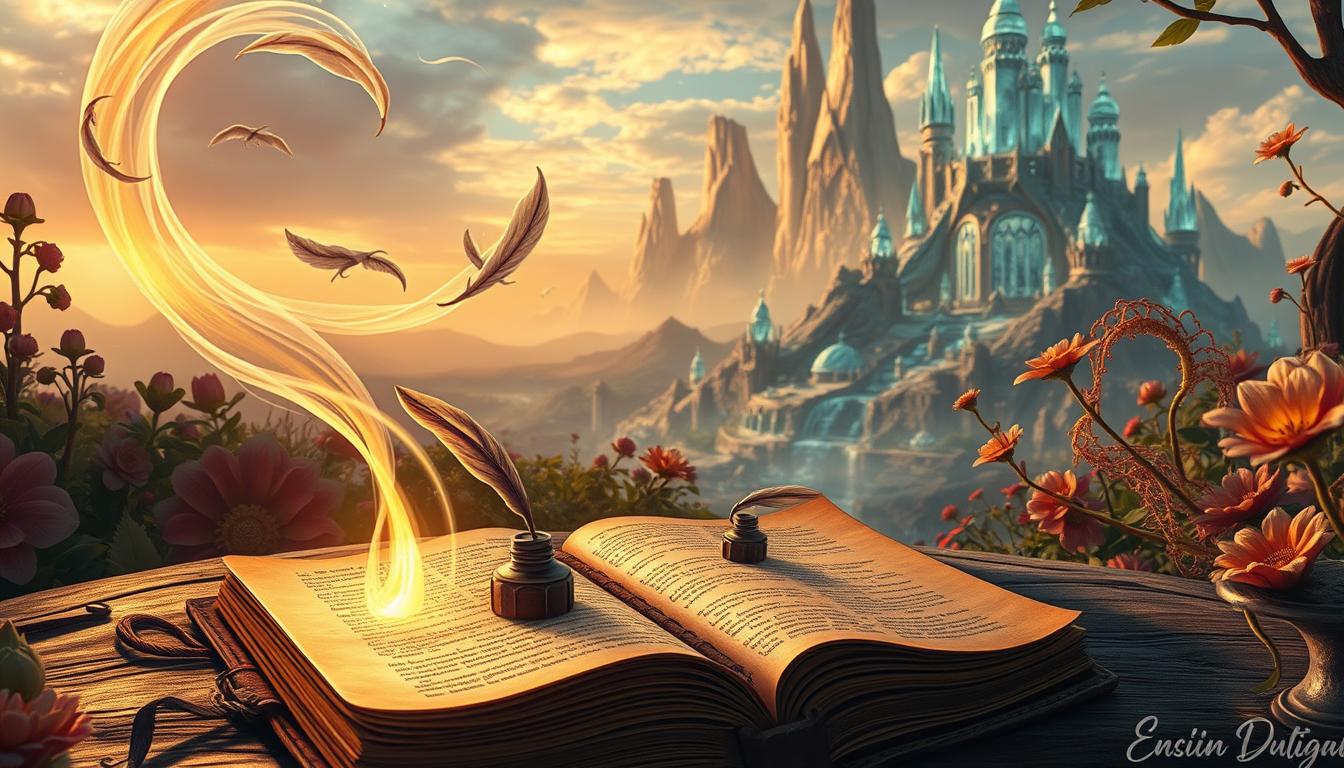Physical Address
304 North Cardinal St.
Dorchester Center, MA 02124
Physical Address
304 North Cardinal St.
Dorchester Center, MA 02124

Step into realms where dragons soar over ancient cities and enchanted forests whisper secrets. Fantasy captivates readers by blending magic, adventure, and limitless creativity. Yet, even the most imaginative minds can stall when building a world from scratch. Where do you begin when possibilities are endless?
This genre thrives on versatility. Merge spellbinding quests with romantic subplots or weave political intrigue into mystical kingdoms. The key lies in balancing originality with relatable themes. But how do you turn vague ideas into gripping narratives?
That’s where structured inspiration shines. Thought-provoking prompts act as creative catalysts, helping you navigate uncharted territories of your story. They provide focus without stifling imagination—a launchpad for tales that feel both fresh and timeless.
Every epic tale begins with a single question: What if the ordinary hid extraordinary secrets? Crafting realms that feel alive demands more than wild ideas—it requires grounding limitless imagination in deliberate choices. This delicate balance separates memorable stories from forgotten drafts.
Seasoned creators know the paradox: infinite options can paralyze progress. Should your world have floating islands or underground cities? Do people age backward, or does time flow differently across regions? Strategic prompts cut through indecision by framing possibilities as solvable puzzles.
Consider these approaches:
While originality matters, understanding reader expectations proves equally vital. Bestselling works often twist familiar themes in unexpected ways. A coming-of-age journey gains depth when the protagonist’s life depends on mastering unstable magic. Market trends shouldn’t dictate your vision but can reveal opportunities to innovate within beloved frameworks.
The true magic happens when structured inspiration meets an author’s unique voice. Prompts aren’t cages—they’re compasses pointing toward uncharted territories waiting for your personal stamp.
In the heart of every legendary realm lies a delicate dance between the impossible and the familiar. While magic sparks wonder, it’s the grounding in human truths that makes stories stick. The best fantasy books don’t just invent—they mirror our struggles through extraordinary lenses.
Effective magic systems thrive on consistency. Whether your sorcery drains life force or requires lunar alignment, establish rules early. “Power without limits rarely satisfies,” notes a seasoned novelist. “Readers crave frameworks they can understand, even if they’re utterly unlike reality.”
World-building follows similar logic. Floating cities fascinate, but their impact multiplies when tied to tangible details—how citizens grow food mid-air or resolve disputes over cloud territories. These choices transform settings into living entities.
Yet the true secret? Universal storytelling bones beneath the glittering surface:
When a dragon’s curse parallels real-world addiction, or a magical school reflects societal hierarchies, fantasy becomes a way to process reality through metaphor. That’s when pages turn themselves.
Creative breakthroughs often start with unexpected questions. What if a blacksmith’s hammer could reshape reality? How might political alliances shift if dreams became currency? These sparks ignite fresh story paths while keeping your world anchored in wonder.

| Prompt Type | Example | Themes Explored |
|---|---|---|
| Genre Blender | A cybernetic elf investigates magic-powered data breaches | Technology vs nature |
| Portal Quest | Library books transport readers to their settings at midnight | Escapism consequences |
| Urban Legend | Subway stations hide gates to elemental kingdoms | Modern life secrets |
| Character Flip | An oracle who hears only lies | Truth perception |
Hybrid scenarios merge familiar elements in surprising ways. Blend steampunk airships with merfolk trade routes. Pair cursed artifacts with corporate boardrooms. These mashups create magic systems that feel both innovative and logical.
Urban settings gain depth when magic hides in plain sight. Imagine bakeries selling emotion-infused pastries or graffiti that alters cityscapes overnight. Ground supernatural elements in tactile details—the smell of spell-charged ink or the weight of a time-shifting pocket watch.
Great ideas often emerge from constraints. Limit your protagonist’s abilities or set stories in single locations. Boundaries fuel creativity better than endless possibilities. As one author notes: “The best tales grow where structure and freedom collide.”
What makes a fictional realm linger in readers’ minds long after the last page? The answer lies in world-building that balances wonder with logic. Your setting isn’t just a backdrop—it’s a character shaping every decision and conflict.

Start by reimagining basic systems. Instead of gold coins, what if traders barter with bottled laughter or stolen years? This world-building guide shows how unconventional economies ripple through societies. Picture markets where merchants weigh memories instead of spices.
| Element | Example | Impact |
|---|---|---|
| Currency | Trading dream fragments | Creates black markets for emotions |
| Climate | Rainfall colored by regional moods | Dictates agricultural rituals |
| Social Hierarchy | Luck measured through bloodlines | Fuels caste system tensions |
Consistency turns wild ideas into believable worlds. If snow falls blue in your place, explain how it affects architecture—do roofs slope steeper to shed heavier flakes? How do children play differently?
Ground magic in tangible consequences. Maybe healing spells drain nearby plant life, forcing villages to ration their use. These cause-effect chains make extraordinary elements feel inevitable, not random.
Remember: the best fantasy settings mirror our life through distorted lenses. A floating city’s class divide might echo real urban struggles, just with sky pirates instead of landlords. Blend the strange and familiar to craft worlds that resonate.
Great fantasy tales feel both comfortingly familiar and thrillingly new. Tropes like chosen heroes and ancient dragons form the genre’s backbone, but their power lies in reinvention. Readers crave recognizable patterns twisted into fresh stories—a balancing act between expectation and surprise.
| Trope | Classic Approach | Modern Twist |
|---|---|---|
| Chosen One | Destined to save the world | Three rivals claiming the prophecy |
| Magic System | Wizards study spells for decades | Spells drain memories from others |
| Dragons | Fire-breathing hoard guardians | Trading wisdom for human years |
Flip perspectives to revitalize old concepts. A Dark Lord’s sympathetic backstory or a mentor’s hidden agenda adds depth. Even classic battles between good and evil gain edge when both sides make morally gray choices.
Consider how people interact with your world’s rules. If elves rule floating cities, how do dwarves adapt underground? When spells require sacrifice, what lines will characters cross to wield magic?
The best fantasy works aren’t about avoiding tropes—they’re about making them yours. Give that dragon a surprising motive. Let the magical artifact solve one problem while creating three others. Familiar elements become unforgettable when filtered through your unique voice.
Behind every enchanted blade and whispered spell beats the heart of someone achingly real. Great fantasy characters thrive when their humanity shines through impossible circumstances—a thief wrestling with newfound power, or a princess who heals wounds but can’t mend broken trust.
Extraordinary settings magnify ordinary struggles. Imagine an orc poet facing prejudice, or a person mistaken for a prophesied hero. These people grapple with identity while navigating magical politics or cursed bloodlines. Their flaws—pride, fear, longing—anchor wild stories in emotional truth.
Abilities should complicate life, not solve problems. A vampire-werewolf hybrid might battle inherited instincts daily. A mage’s power could erase memories with each spell. Such costs force growth, turning characters into architects of their own redemption.
The best arcs emerge from self-discovery. When a blacksmith learns her hammer bends reality, does she reshape people or break the tool? Choices born from authentic desires—love, belonging, purpose—make fantasy feel urgent, no matter how strange the world.
True story magic happens when readers see themselves in fire-wielders and star-crossed fae. Give your characters room to stumble, adapt, and redefine what ability means. Their journey becomes the compass guiding audiences through your wildest creations.